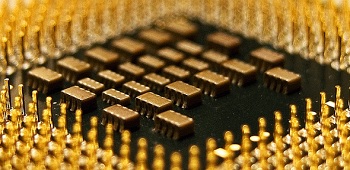Phase-Change Materials (PCMs), which have been around since the 1960s when they were used in optical-memory devices, are currently being adapted for electronic-memory operations and are set to replace silicon-aided flash memory in smartphones.
 Silicon city. Image Credit: Oliver Hammond via flickr.
Silicon city. Image Credit: Oliver Hammond via flickr.
A number of researches have proven that logic-processing functions of PCM-based devices are possible in non-volatile memory cells by applying ultra-short voltage pulses in specific combinations. However, this is not possible for silicon-based devices.
In PCM-based devices, memory and logic operations are not separated as they are in silicon devices. It is believed that PCMs will soon be able to enhance processing speeds of laptops by 500 to 1000 times that of existing speeds, whilst also saving energy.
Researchers have carried out numerous calculations to show that they are possible with these devices. PCM-based devices also have the capability to operate down to about 2 nanometres, thus overcoming the size-scaling limit of existing logic and memory devices.
PCMs tend to be unstable in the starting amorphous phase. However, this issue was tackled by researchers from Cambridge and Singapore by reversing the logic-operation procedure and beginning from the crystalline phase followed by melting of the PCMs to carry out the logic operations. As a result, the stability of the materials increased and they were also capable of performing logic operations much quicker.
Currently, the intrinsic switching speed (around 10 nanoseconds) of PCMs make them ideal substitutes for flash memory. By increasing their crystallization speeds to less than 1 nanosecond, researchers believe that these materials will soon replace computer dynamic random-access memory (DRAM).
According to Professor Stephen Elliott from Cambridge's Department of Chemistry, the DRAMs currently available consume lots of energy and are thus expensive and have negative effects on the environment as a result. A PCM-based, non-volatile device would therefore be a much better and ‘greener’ choice for the future. The results were published in the journal Proceedings of the National Academy of Sciences.